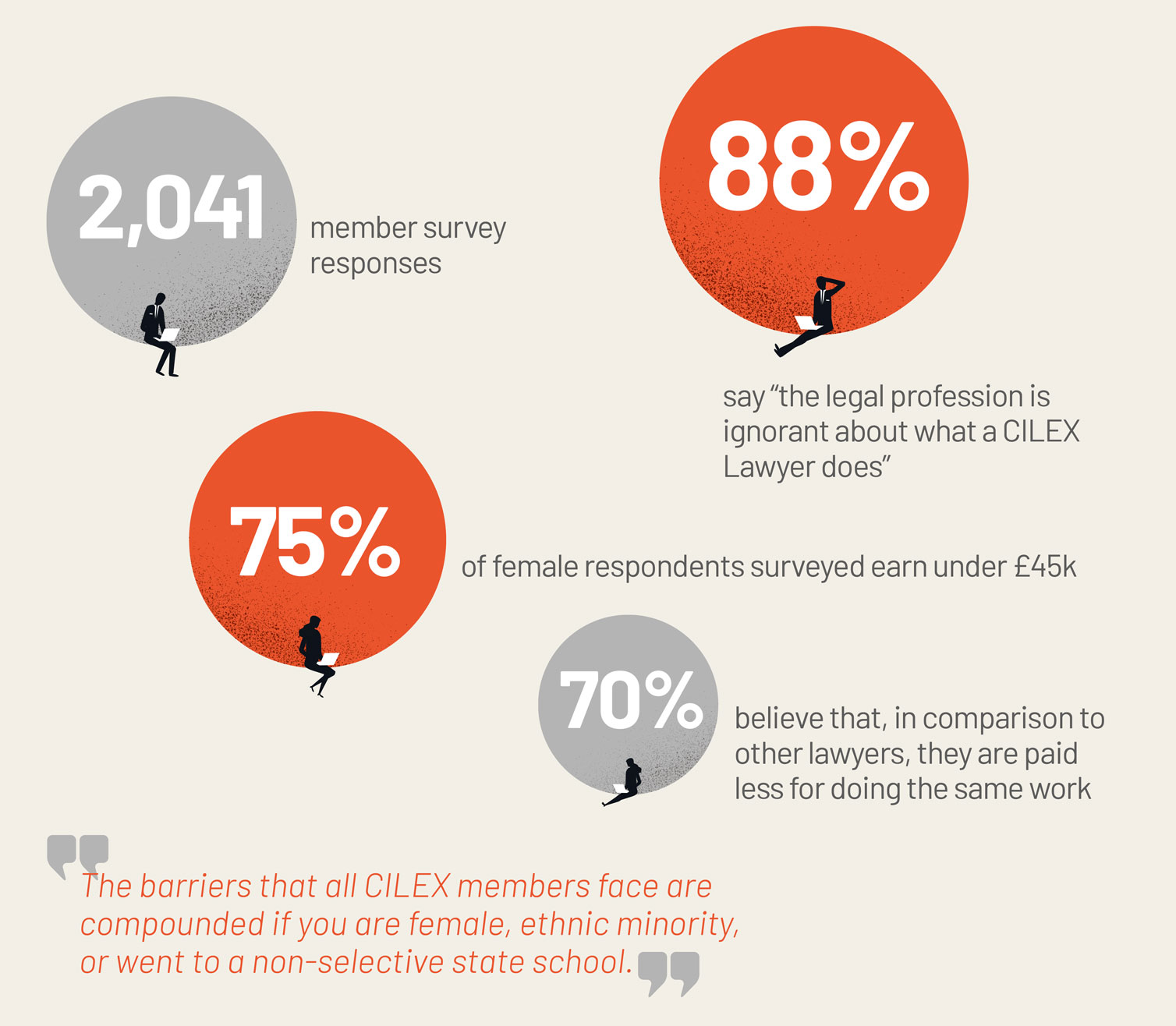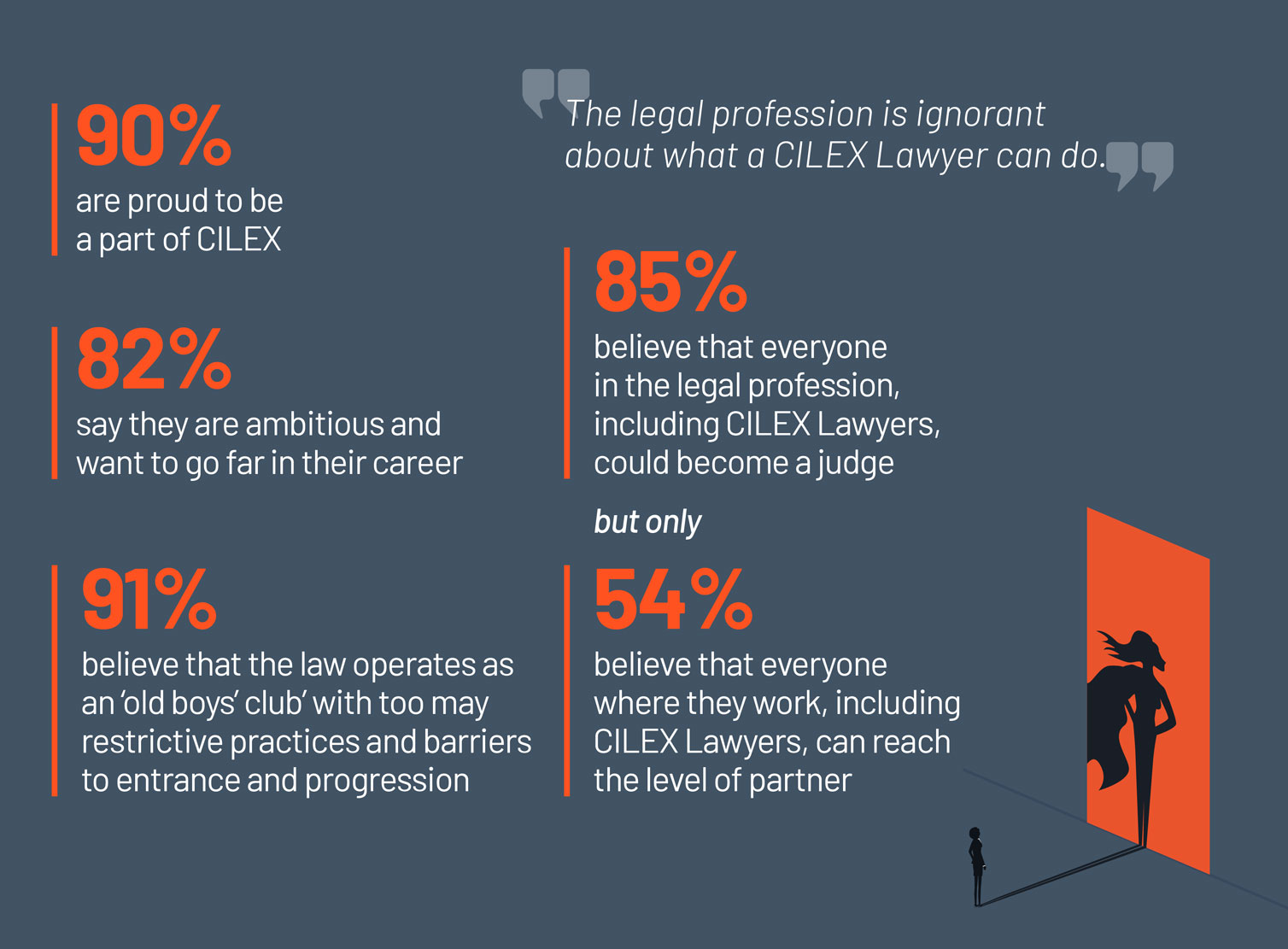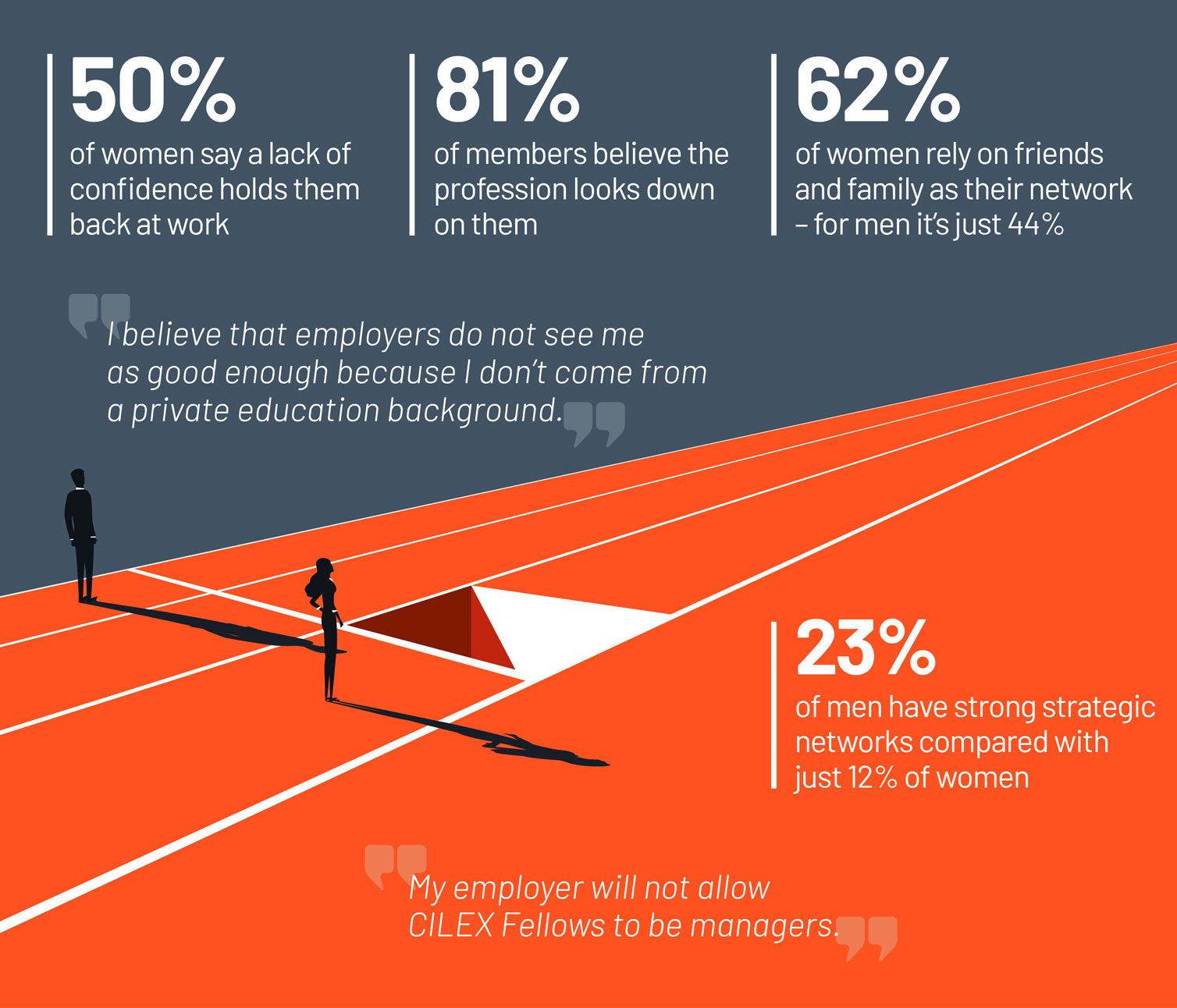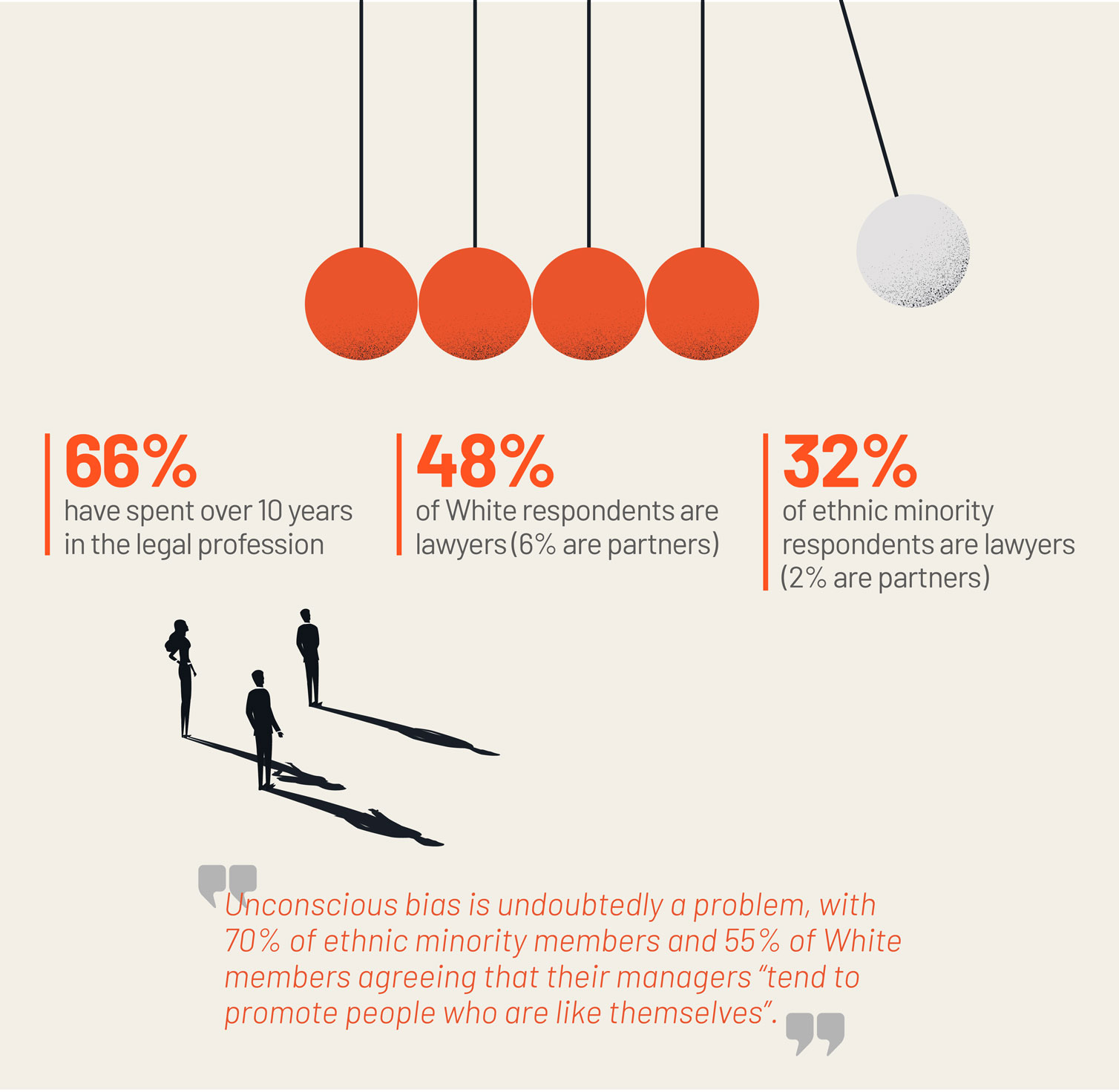
State of the nation
Neil Rose reports on ground-breaking research into the experiences and views of CILEX members on barriers to progress in the legal profession

Now the not-so-good news: “They mostly feel good about their position as a CILEX lawyer but think that the wider legal profession looks down on them.”
Researchers at The Pipeline found “huge support across the board” for statements where this feeling could be expressed.
They explained: “That ‘CILEX lawyers are considered to be lesser lawyers than solicitors’ is a sentiment that was expressed repeatedly in various ways in the comments. We cannot express this point strongly enough.

“These views were widespread. It seems akin to them working daily in a ‘hostile environment’.
“The barriers that all CILEX members face are compounded further if you are female, ethnic minority, or went to a non-selective state school.”
None of this may come as a great surprise to many readers but there is something about seeing it in black and white – about realising just how widespread this feeling is – that brings home the magnitude of the struggle.
As the wider legal profession wrestles with problems of discrimination on the basis of gender, race, disability and so on, comments by CILEX members about discrimination “indicate that concerns are more about perceptions of the value of CILEX lawyers than demographic discrimination”.
But that is not to downplay other discrimination – 75% of women surveyed earn under £45,000, compared to only 61% of men, with similar proportions considering that, in comparison to other lawyers, they are paid less for doing the same work.
Perhaps surprisingly, those in private practice law firms are the least likely to say they have been subject to discrimination in their legal careers (around 30% say they have) – those working in-house at various types of employer report it more.
Three-quarters of lawyers working at smaller (20 partner or fewer) firms say their employer gives equal opportunity to all irrespective of their route into law, and noticeably more than those in larger firms (59%), as well as central and local government (54% and 63% respectively).
Members who work in large private practice firms are most likely to feel that they are paid less for doing the same work as other lawyers (82% say this), with 76% of employees of firms with 11 to 20 partners and working in-house saying the same.
Tricky confidence
The demographics of respondents largely matched the make-up of the CILEX membership, although Fellows were a bit over-represented (40% of members, 49% of respondents).

Members were given a series of statements with which to express their agreement or disagreement. The clear message from those they agree with most is confidence of the quality of their education and qualification.
Almost every respondent backs statements like “I want employers to know that CILEX lawyers can be as good as any other lawyer” and “CILEX lawyers should be allowed to act in all aspects of law as long as they have completed the training giving them the knowledge and competence to do so”.
There is overwhelming confidence that they have the right qualifications and experience to fulfil their current roles. “I am so proud of my FCILEX achievement,” writes one. “It has given me the confidence to excel and look for other opportunities that wouldn’t previously have been open to me.”
Nine in 10 are proud to be a part of CILEX – most respondents say they would not have had a career in the law without it – and see the organisation as “a breath of fresh air that the legal profession needs”.
This is particularly the case as a similar number view the law as an “‘old boys’ club’ with too many restrictive practices and barriers to entrance and progression”. It needs, members are sure, to be modernised for the 21st century.
Good CILEX lawyers, they assert, mean that access to justice is affordable to more people. But with 88% saying that “the legal profession is ignorant about what a CILEX lawyer can do” and 81% believing the profession looks down on them, there is clearly a huge barrier.
The statements with the highest level of disagreement reinforce that good level of robust confidence amongst members – for example, the most disagreed-with statement is “I have turned down a promotion in the past because I felt that I didn’t have the right experience to do the job”. (82%).
Instead, CILEX members have high expectations of themselves – 82% agree with the statement “I am an ambitious person and I want to go far in my career” and even more believe they have the capabilities and qualifications to do their next role.
Employer mismatch

But this exercise indicates that the confidence is not shared by employers. Most respondents have not received leadership development training in the past two years to help them prepare for a leadership role, nor are many “actively encouraged to apply for positions that I am not personally confident about getting”.
One respondent says: “In my personal experience, CILEX lawyers are treated with less respect, and are paid substantially lower salaries, than trainee solicitors and counterparts, despite having far more working experience and knowledge.”
Another writes: “My employer will not allow CILEX Fellows to be managers, so once qualified as a Fellow I will have reached as far as I can go at my current job. The rationale being that solicitors do a wider range of work than CILEX lawyers.”
There are, the researchers say, many, many more comments along these lines.
The findings starkly lay out the difference between the scale of ambition thought possible in the workplace, compared to the wider profession: while only 54% agree that everyone where they work, including CILEX lawyers, can become a partner, 85% say that everyone in the legal profession, including CILEX lawyers, can become a judge.
Though we will go on to see gender differences – ‘regular’ discrimination is, of course, a problem – The Pipeline found that “men and women are equally ambitious, but neither are being supported in career-development planning”.
Imposter syndrome
It is well established that women at work do not have the same level of self-confidence as men and are more likely to suffer from imposter syndrome, issues CILEX has sought to address. With women making up three-quarters of the membership, it is a particularly urgent problem.
The survey results bear out these self-doubts. Half of women, but only 29% of men, agree that “I frequently hold myself back at work due to a lack of confidence”.
Women are much more likely to be frustrated with themselves for not expressing their views more forcefully – the right words often only come hours later – and feel that “when senior leaders ask me about myself, I find it hard to speak about my capabilities in a way that they would remember”.
There is more gender parity with this statement: “When I make a good point in a meeting, I frequently find that when others make it later, they are more likely to be recognised and praised for it” (40% of women and 32% of men). Maybe that’s more to do with status than gender.
Some of the comments support this. One respondent speaks of a “lack of confidence as a result of years of being referred to as ‘only’ a legal executive and being prevented from undertaking some areas of work open to solicitors”.
Confidence seems to go hand in hand with anxiety about work – 60% of women and 45% of men agree: “I regularly find myself lying awake at night worrying about work.”
This may also be linked to having insufficient support structures in the workplace. The survey finds a majority of men and women do not see senior role models in their firms and few recognise themselves as having a sponsor.
“Not having a consistent role model within the work environment acts as a barrier as I feel I have no guidance,” writes one respondent.
However, men have stronger “strategic” networks (23% of men, 12% of women). Women (62%) are more likely to rely on friends and family as their network than men (44%).
Seniority gap
Some 284 of respondents came from ethnic minorities and the picture painted – though not necessarily a surprise – is not a pretty one.
Though two-thirds of all members surveyed have spent over 10 years in the legal profession, White members are more senior than ethnic minorities: 48% of White respondents are lawyers (6% are partners) compared to 32% of ethnic minority respondents (2% are partners).
This is even though ethnic minority members are better educated –33% have a post-graduate qualification, 34% degree-level, 22% reached further education and only 11% are school leavers. For White members, it is 11% post-graduates, 24% degree-level, 35% further education and 28% school leavers.
Other demographic differences of note are that nearly a third (32%) of ethnic minority members went to schools outside the UK (only 4% of White members did) and a higher proportion are men (27% compared to 19% of White members).
Perhaps as a result, confidence is less of a problem: only 37% of ethnic minority members agree with the statement “I frequently hold myself back at work due to a lack of confidence”, compared to 49% of White members.

The research says: “Although ethnic minority members are more likely to feel ambitious, have had the courage to speak to their manager about a promotion, and expect to move to their next role in the next 12-18 months, they are more likely to expect to be passed over for promotion, to feel that managers promote people like themselves, and are less likely to feel recognised at work.”
The results indicate that, compared to ethnic minority colleagues, White colleagues are better networked, know who is influential, have the role models they need, are encouraged to make connections, and have managers who are more likely to actively help them to fund opportunities to address career development needs.
Unconscious bias is undoubtedly a problem, with 70% of ethnic minority members and 55% of White members agreeing that their managers “tend to promote people who are like themselves”.
This presumably goes for both skin colour and professional qualification. Although ethnic minority members are more likely to say they are, for example, rarely recognised and praised for their work, or often find themselves asking for permission to do things rather than going straight ahead, there are significant numbers of White members who say the same.
Disappointingly, almost half (47%) of ethnic minority members have experienced discrimination in their legal career, compared to 31% of White members.
The findings say: “Ethnic minorities are more likely to feel they cannot be themselves and have had to change their appearance, and they are less likely to believe their employer gives equal opportunities –whether by ethnicity, educational background or social class.
“When they make points in meetings, other people are likely to be praised for them and they feel they are more likely to be penalised for mistakes than others.”
Strikingly, 84% of ethnic minority members agree that diversity is not valued in the legal profession, compared to of 59% of White members.
While 90% of White members believe their employer gives equal opportunities for those of all ethnicities, only 62% of ethnic minority members agree.
Indeed, there is a similar pattern of greater scepticism on the part of ethnic minority members in relation to multiple characteristics – educational background, social class, age, gender, route into law and sexual orientation.
School dance
The other main characteristic where The Pipeline sought to break down views is in relation to school background.
“The type of school attended has a correlation with confidence and fitting in,” it says. “Respondents from selective state schools are much more likely to feel able to speak up and be listened to in the legal profession.
“But those who went to schools outside of the UK, or to a non-selective state school, feel uncomfortable raising issues and are often frustrated about not expressing themselves more forcefully.”
Nearly half (49%) of those from non-selective state school – compared to 33% selective, 43% independent, 43% from schools outside of UK – agree that they frequently hold themselves back at work due to a lack of confidence.
“CILEX members are ambitious, particularly those from non-selective state schools and schools outside of the UK,” the research continues.
“Fewer of these members feel they have role models or rely heavily on strategic networks. However, people from selective state schools feel more at ease with networking and are armed with the knowledge of what they need to so to get ahead.”
Priority call
So what do members want CILEX to do to help them address the problems they face? Asked to rank 14 priorities, broader issues around career progression come out as the main concern, with respondents identifying “establishing/creating a clear progression/career path for CILEX lawyers” as by far the biggest ask of their professional body.
The other big priorities are helping CILEX lawyers to take on senior roles (partners, judges, heads of legal services and so on), and increasing the breadth of law in which CILEX lawyers are allowed to practise.
While few members rank being allowed to hold more senior judicial office as their top issue, many mentioned it in the top six. Creating a career pathway in mediation and enabling CILEX lawyers to join mortgage lender panels also featured high up many respondents’ lists.
It is clearly at this high level that members see CILEX’s main role, with helping individual members with their career progression, such as by teaching them how to find a sponsor at work, ranking lower.
The research provides CILEX with the most extensive empirical research to date on what its members think and want. The challenge now is responding to it.
In articles elsewhere in this issues – from CILEX chair Professor Chris Bones and CILEX president Caroline Jepson – you can see how the organisation is going to work to match the considerable and welcome ambitions of its members.
The Pipeline is one of the largest gender and diversity consultancies in the UK, providing organisations with the data and insight necessary to achieve greater diversity and inclusion at all levels in the workplace.